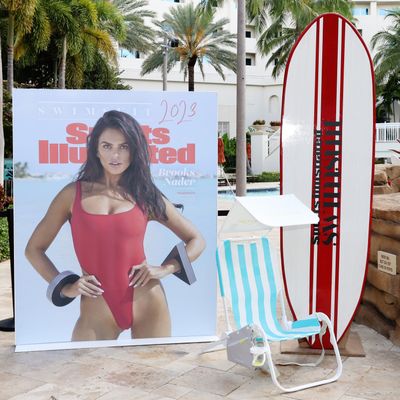
After almost 70 years, Sports Illustrated — the storied magazine that has published some of the best sports journalism of the past two centuries — appears to be over, at least as anyone knew it. On Friday, the union representing the magazine’s reporting staff announced that the Arena Group, the company that owned S.I.’s publishing license, will be laying off “a significant number, possibly all” of its 100 employees. “Some employees will be terminated immediately, and paid in lieu of the applicable notice period under the [the union contract],” an email to staffers said, according to Front Office Sports.
The reason for the magazine’s sudden closure came down to debt. Sports Illustrated had been housed in a complex corporate structure ever since it was sold by Meredith to Authentic Brands Group in 2019 for $110 million. Later that year, ABG — whose largest shareholder is asset manager BlackRock, owns Reebok, and manages the likeness of Muhammed Ali — sold off the publishing rights to a company called Maven, which was led by publisher Ross Levinsohn. (Maven would later change its name to The Arena Group.) That deal meant that Arena had to pay $15 million a year for ten years.
Those payments had deeply strained the magazine’s operations. In February, management laid off the magazine’s sports editors, one employee told me. “Genuinely, everyone looked around at each other and said, ‘What do we do when one of the NBA writers files something when the editor was just fired?’ And that repeated over and over, in every sport. Like, you guys, I don’t know if you’ve read the title of our publication.”
In August, Manoj Bhargava’s Simplify Inventions — the company that makes 5 Hour Energy drinks — bought a majority stake in Arena. Soon after, Futurism found that S.I. was publishing error-riddled, A.I.-written articles, a revelation that embarrassed the company and led to an internal investigation. Bhargava later held a town hall where he told staffers that “The amount of useless stuff you guys do is staggering,” according to Front Office Sports. Soon after that, Levinsohn left, as did Andrew Kraft, the president and chief operating officer, in what was largely seen internally as a clash between Bhargava and the previous C-suite. “Ross and Kraft were widely despised from day one. I’m glad to see them gone but not convinced Manoj will be that much better,” another employee said in December. Bhargava then stepped into the role of Arena’s interim CEO.
The end functionally came on January 3, when Arena Group failed to make a $3.75 million debt payment to Authentic Brands, according to securities filings. That gave Authentic the right to revoke the publishing license (as well as collect $45 million in another payment). The next day, Bhargava stepped down as interim CEO to avoid “conflicts of interest.” Staffers had found the final months before the closure bleak, with morale low. “It’s like, What are they doing fucking around with us?” one told me. “They spent $100 million on us. They’ve already gotten the 60 million back, just because it’s been four years.”
It’s not clear what will happen with Sports Illustrated’s stories, or its brand. Arena Group said it “plans to sustain our commitment to delivering quality content throughout the ongoing discussions,” and that it is still talking with Authentic Brands, according to the Associated Press. Arena’s publishing license was terminated, according to Authentic Brands Group, which said in a statement that it “is here to ensure that the brand of Sports Illustrated, which includes its editorial arm, continues to thrive as it has for the past nearly 70 years,” and that “we are committed to ensuring that the traditional ad-supported Sports Illustrated media pillar has best in class stewardship to preserve the complete integrity of the brand’s legacy.”
This post has been updated and corrected. An earlier version said BlackRock has a controlling stake in Authentic Brands Group.






























